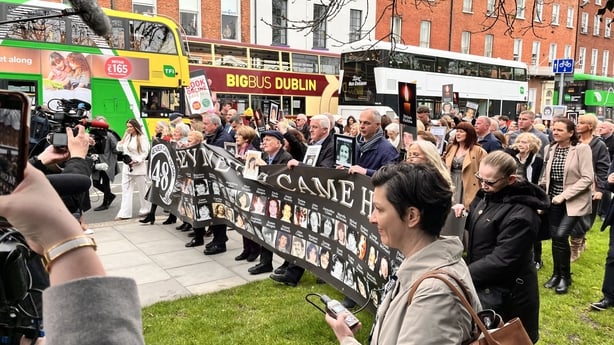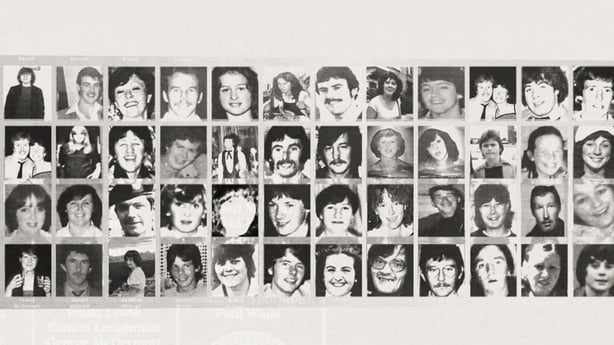Verdicts of unlawful killing have been returned at the inquests into the deaths of 48 people who died in the 1981 fire at the Stardust nightclub in Dublin.
The 12-person jury delivered the verdict of unlawful killing to a packed courtroom in the Pillar Room on the grounds of the Rotunda Hospital in Dublin city centre this afternoon.
The families in court cheered and applauded as the verdict was read out.
The jury found the fire started in the hot press in the main bar and was caused by an electrical fault.
That finding is in stark contrast to the original 1982 Keane Tribunal finding that the fire was "probably caused deliberately". That conclusion, which was long contested by families of the victims, was struck from the record in 2009.
The jury could not say exactly when the fire began, but found the blaze was first seen outside the building between 1.20am and 1.40am.
They found that the fire was first seen inside the ballroom between 1.35am and 1.40am.

The jury found that polyeurthane used at the nightclub, the ceiling tiles and the height of the ceiling in the west alcove all contributed to the fire.
A number of factors were found to have contributed to the difficulty of the crowd leaving the nightclub, including the failure of the lighting, the lack of staff preparedness and lack of visibility.
The jury found that exits were locked, chained or otherwise obstructed.
They found that the victims were impeded in their ability to access exits and get through them.
These factors caused and contributed to the deaths of the victims, the jury found.
The first emergency call was made at 1.43am. The gardaí arrived at 1.50am. The time the major accident plan was implemented was at 2.06am. Stage 2 of the plan was activated at 2.12am.
Six people died following their removal from the premises.
We need your consent to load this rte-player contentWe use rte-player to manage extra content that can set cookies on your device and collect data about your activity. Please review their details and accept them to load the content.Manage Preferences
What is a verdict of unlawful killing?
During the course of the inquests, coroner Dr Myra Cullinane outlined the five verdicts that were open to the 12 members of the jury.
She said there were five possible verdicts available to them - accidental death, death by misadventure, unlawful killing, open verdict and narrative verdict.
Dr Cullinane said for the jurors to return a verdict of unlawful killing, then the standard of proof needed was "beyond a reasonable doubt".
She said the jury must consider all of the evidence they heard to reach their determinations and said what to accept or reject was a matter for them.
Dr Cullinane also said she was reminding the jurors that the proceedings are inquisitorial, with the purpose to inquire into a given death and to establish certain facts and to return a verdict based on the evidence heard.
She said it was a fact-finding exercise and not a trial.
Referring to the Coroner's Act, she said civil or criminal liability shall not be considered or investigated and said the "language is clear" - the jurors could not investigate or consider whether any person is liable or responsible for a given death.
She said, too, that they cannot conclude that a person committed a crime or is guilty of negligence.
The Act states that no finding or verdict shall contain censure or exoneration of any person, she said.
Dr Cullinane added that the findings must be factual in nature and not blame anybody.
The coroner said in plain terms, the verdicts and findings were about acts and omissions and not about who may have carried them out.

'Very difficult testimony'
Those in the court got to their feet and applauded the jury. The coroner paid tribute to them saying she was very grateful to their service.
Dr Myra Cullinane said they were the longest running inquests in the history of the State and said the jury had stood outside their normal lives to attend court. She said they had heard very difficult testimony
The coroner also said she wanted to acknowledge the relatives' ongoing grief and said the holding of the inquests was in no small part down to their persistence.
Dr Cullinane also said we remember the 48 people who lost their lives.
Government to consider verdict
In a statement he paid tribute to those who campaigned for the inquests to be held: "Their relentless pursuit of truth and accountability, their profound commitment to justice, even in the face of overwhelming challenges and setbacks, was not only a fight for their loved ones but a campaign to ensure that such a disaster never happens again."
He said the Government would now consider today's verdict "and the recommendations of the jury".
Over 100 days of evidence
The inquests proceedings began last April following a sustained campaign by relatives.
It sat for over 100 days, and heard evidence from more than 300 witnesses.
The inquests have been the longest held in Ireland to date.
The witnesses included former staff at the night club, survivors, emergency responders and fire experts.
Forty-eight people, aged between 16 and 27, died in the St Valentines Day disaster in Artane in north Dublin 43 years ago.
It was revealed yesterday that the foreman told coroner Myra Cullinane that the jury's seven women and five men could not reach a unanimous verdict.
The coroner then said she would accept a simple majority of seven and allowed deliberations to continue.
Fifteen minutes later, the jury returned and confirmed it had reached majority verdicts.
Ms Cullinane said she would defer the announcement of the verdicts and findings to today to allow interested persons and family members to make arrangements to attend court or watch online.
Additional reporting: Colman O'Sullivan






